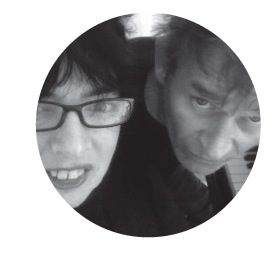
Shelley Hirsch and Simon Ho.
Where were you then? Greenpoint vocalist Shelley Hirsch and Swiss keyboardist composer/arranger Simon Ho’s new CD is an evocative, nostalgic, and stylistic exploration of personal and cultural memory.
Hirsch was born in East New York, Brooklyn, and has been a seminal and influential presence in the new music and performance art scenes. Throughout her rich career Hirsch has been able to continually broaden and deepen her work musically and emotionally while still making every song sound like a revelation.
This album is a song cycle built from recordings and arrangements created collaboratively and individually over an extended period beginning in 2006. Together Shelley and Simon weave songs, spoken word, and instrumentals into a panorama that encompasses childhood, love, animals, travel, and death.
The first track, “I Love Glider Planes,” brings to life a distant memory from childhood. Arranged with a chamber sized string ensemble, it evokes not so much the day itself, as the impact of the day as seen through the romantic lens of nostalgia. Deeply personal, the song is kinesthetic and layered with inscrutable meaning in the way that only childhood memories can be. We can’t relive the experience with Shelley, but she can rekindle the magic of the day and the surprise and delight of being.
“Never Should I Have Seen You,” a bittersweet narrative ballad, is arguably the most accessible and inviting work. Its structure is that of an Edith Piaf ballad complete with
accordion accompaniment, but the syntax and the grammar is totally Yiddish. The familiar structure of the song plays the perfect straight man to Shelley’s slightly comic, slightly bizarre, but ultimately sincere channeling of Yiddish culture through her vocal style and personal experience.
“Julius,” a dark reminiscence of love in the shadows, brings to mind the music of Kurt Weil and the ambiance of exploring dark, empty streets. Whether Julius is really a street dog or just an extension of the old saying, men are dogs, is ultimately of no moment because the song is about love—sandpaper tongues, panting breath, and all.
Shelley’s style has always been polyglot in its influences but the result rises above its sources and emerges as a unique sound that is unlike any other, residing at the boundary between epiphany and emotional collapse. Part performance artist and part chanteuse, her appeal has as much to do with her emotional presence (and vulnerability) as with the formal structure of her pieces.
In this collection we can hear ancient Jewish chanting and Middle Eastern vocal modalities vie with pop and new music tropes. What keeps Shelley’s music coherent is her unique extended vocal style combined with her expressive narrative powers. Every song, no matter how abstract or literal, tells a story infused with emotion and personal truth.
While many of Hirsch’s narratives tell stories with a beginning, middle, and end, they don’t all function that way nor do they need to. Simon Ho’s crystalline arrangements and the songs’ formal clarity create their own logic. “Giselle (Carousels)” is the perfect pathway into this magical mysterious musical memory box. It brings to life the evocative sounds of a calliope and a verbal stream running a circular course in and around the moving horses.
More sobering, “The Nursing Home,” is your invitation to accompany Shelley on a visit to her mother in a nursing home. Structured like a chant, with echoes of the synagogue and Philip Glass minimalism, it is a path down a road that we don’t want to travel. On pieces like these, her music is perhaps closer to a form of poetry than song.
Shelley Hirsch will be performing selections from her new CD at the release party at Roulette on March 29 & 31, 8pm, 509 Atlantic Ave, Brooklyn. Call (917) 267-0363 for more information.
Robert Egert is an artist, UX designer, and writer.
Twitter: @psychomotikon
robertegert.com and motikon.com
Leave a Reply